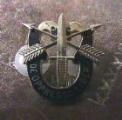En effet, sur ce lieu se sont déroulés, il y a tout près de 250 ans, deux affrontements importants de la guerre de Sept Ans, soit la bataille des plaines d’Abraham, le 13 septembre 1759, opposant l’armée française - dirigée par le marquis de Montcalm – et l’armée britannique – menée par le général James Wolfe ainsi que la bataille de Sainte-Foy, le 28 avril 1760, opposant les deux mêmes armées, cette fois dirigées par le chevalier de Lévis et le général James Murray.
....
C’est pourquoi, elle entend organiser, le dimanche 13 septembre 2009, sur les plaines d’Abraham,
un rassemblement des descendants patronymiques des militaires qui composaient alors
les armées française et britannique ainsi que des descendants des miliciens et amérindiens ayant combattu, en alliés, aux côtés de ces armées.




 . And, yes I agree, it is a 101 class. What I was hoping to find, and it doesn't really show up in the main article Rex linked to unfortunately, was if they had expanded it significantly beyond the Israeli-Palestinian group. Anyway, I've emailed Scott to see if they have done any more elaboration on it.
. And, yes I agree, it is a 101 class. What I was hoping to find, and it doesn't really show up in the main article Rex linked to unfortunately, was if they had expanded it significantly beyond the Israeli-Palestinian group. Anyway, I've emailed Scott to see if they have done any more elaboration on it.

 . One of the students I'm supervising had an ancestor at the Windmill and one of my ancestors was there as well. We were out after class one night hoisting a few with some other students, and the look of incredulity when we both started talking about it on the face of one student from the Middle East was really hilarious
. One of the students I'm supervising had an ancestor at the Windmill and one of my ancestors was there as well. We were out after class one night hoisting a few with some other students, and the look of incredulity when we both started talking about it on the face of one student from the Middle East was really hilarious  . Yeah, I think we did a lot pretty well. And, when you get right down to it, the gender imbalance didn't hurt either
. Yeah, I think we did a lot pretty well. And, when you get right down to it, the gender imbalance didn't hurt either 




 .
.


Bookmarks